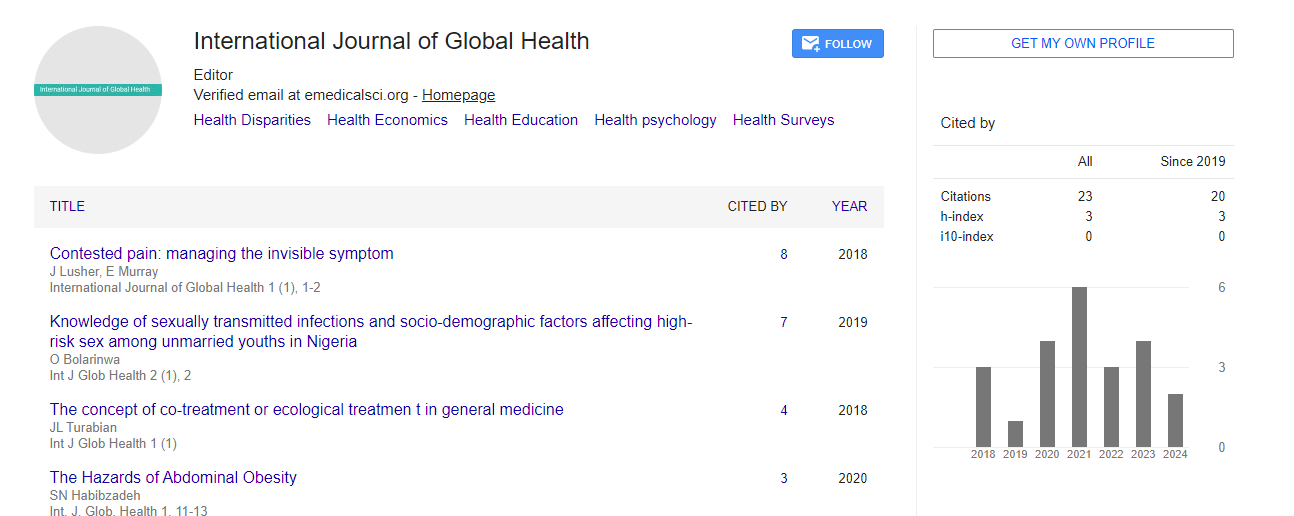Perspective, Int J Glob Health Vol: 6 Issue: 4
Empowering Communities: Keys to Sustainable Health Initiatives
Hugh Phillip*
1Department of Biomedical Engineering, Quantum University, Metropolis, USA
*Corresponding Author: Hugh Phillip,
Department of Biomedical Engineering,
Quantum University, Metropolis, USA
E-mail: Philliphugh54@qusm.edu
Received date: 27 November, 2023, Manuscript No. IJGH-24-125942;
Editor assigned date: 29 November, 2023, Pre QC No. IJGH-24-125942 (PQ);
Reviewed date: 14 December, 2023, QC No. IJGH-24-125942;
Revised date: 21 December, 2023, Manuscript No. IJGH-24-125942 (R);
Published date: 28 December, 2023, DOI: 10.4172/Ijgh.1000194
Citation: Phillip H (2023) Empowering Communities: Keys to Sustainable Health Initiatives. Int J Glob Health 6:4.
Description
The landscape of community health initiatives worldwide is marked by a rich tapestry of successes, failures, and valuable lessons that have shaped the trajectory of public health interventions. A nuanced exploration of these initiatives, as examined in the International Journal of Global Health, provides insights into the factors influencing community health outcomes, the challenges faced, and the invaluable lessons gleaned from diverse experiences. Numerous community health initiatives have achieved notable successes, contributing to improved health outcomes and enhanced well-being among populations globally.
Initiatives that prioritize community engagement and empower local populations tend to yield sustainable success. Empowering communities to actively participate in decision-making, health education, and the implementation of interventions fosters a sense of ownership and ensures that initiatives align with the unique needs and context of each community. Successes are frequently observed when interventions are culturally sensitive and tailored to the specific cultural, social, and linguistic nuances of the target population. Culturally competent initiatives are more likely to be accepted and embraced by communities, leading to increased effectiveness and adherence.
Collaborative efforts involving partnerships between governmental bodies, non-governmental organizations, healthcare providers, and local community organizations contribute to the success of health initiatives. Multisectoral collaborations leverage diverse expertise, resources, and perspectives, fostering a holistic and integrated approach to community health. Initiatives emphasizing preventive and primary healthcare play a crucial role in improving health outcomes. By addressing underlying determinants of health and promoting preventive measures, these initiatives contribute to reducing the burden of diseases and enhancing overall community well-being.
The integration of innovative technologies, such as telehealth, mobile health applications, and data analytics, has proven successful in reaching remote or underserved communities. Technology facilitates improved healthcare access, real-time monitoring, and datadriven decision-making, enhancing the efficiency and impact of community health interventions. Alongside successes, community health initiatives face inherent challenges and occasional failures. Identifying and understanding these challenges is crucial for refining strategies and avoiding pitfalls:
Insufficient resources, including funding, healthcare infrastructure, and trained personnel, pose significant challenges to the success of community health initiatives. Limited access to resources can hinder the implementation and sustainability of interventions, particularly in low-resource settings. Failure to address cultural and linguistic barriers may impede communication and trust between healthcare providers and communities. Inadequate consideration of cultural diversity can result in interventions that are not culturally relevant, leading to lower engagement and effectiveness.
Political instability, socioeconomic disparities, and governance issues can create challenges for community health initiatives. Political and economic factors influence the allocation of resources, policy implementation, and the overall success of health interventions. Resistance to change within communities or healthcare systems can undermine the success of initiatives. Overcoming resistance requires effective communication, community education, and a participatory approach that values the perspectives and concerns of all stakeholders.
Initiatives that lack a comprehensive, long-term planning perspective may struggle to achieve sustained impact. Short-term approaches may result in temporary improvements but may not address underlying systemic issues or ensure enduring community health benefits. The collective experiences of community health initiatives worldwide offer valuable lessons that shape future endeavors:
A community-centered approach, prioritizing the involvement of communities in the design, implementation, and evaluation of initiatives, is essential for success. Community members are key stakeholders and active participants in their own health. The ability to adapt and be flexible in response to changing circumstances and community needs is crucial. Initiatives that incorporate feedback, learn from challenges, and adjust strategies accordingly are more likely to achieve sustained success.
Addressing community health comprehensively requires interdisciplinary collaboration. Initiatives that consider social, economic, environmental, and cultural factors holistically are better equipped to create lasting positive impacts. Capacity building within communities, including health education and skill development, is foundational. Empowered communities can take ownership of their health, participate in decision-making, and contribute to the sustainability of health initiatives. The global health community benefits from initiatives that prioritize collaboration and knowledge sharing. Insights gained from successes and failures can inform best practices, guide future interventions, and contribute to a collective learning process.
Conclusion
In conclusion, the exploration of community health initiatives worldwide illuminates the complex interplay of successes, failures, and lessons learned. By acknowledging the diversity of communities, addressing challenges with adaptability and innovation, and incorporating the lessons gleaned from past experiences, the global health community can continue to refine its approach to community health. The ongoing pursuit of effective, culturally sensitive, and sustainable initiatives remains paramount in the endeavor to improve health outcomes and enhance the well-being of diverse populations around the world.
 Spanish
Spanish  Chinese
Chinese  Russian
Russian  German
German  French
French  Japanese
Japanese  Portuguese
Portuguese  Hindi
Hindi 
